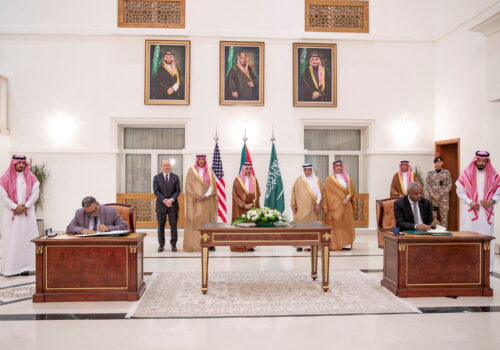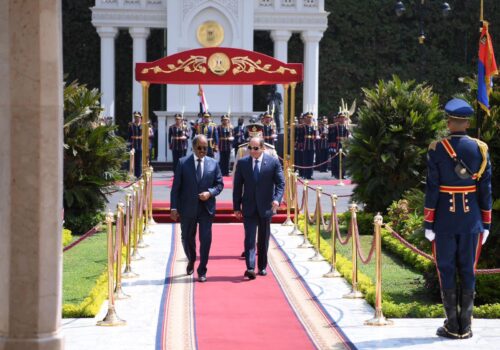Sudan has a famine. The gridlock on peace and security must end.
The Famine Review Committee (FRC) confirmed famine in Sudan’s Northern Darfur region due to ongoing war, setting a critical alert for the international community. It emphasizes the acuteness of the world’s largest hunger crisis, which affects more than 25.6 million people, approximately half Sudan’s population. Decades ago, even before the current conflict erupted, Sudan persistently struggled with a severe humanitarian situation, which added to the political instability and economic crisis and put 15.8 million people in need of humanitarian assistance. The ongoing conflict, which began on April 15, 2023, has worsened these challenges, necessitating immediate actions toward a ceasefire.
Since the fighting between the Rapid Support Forces (RSF) paramilitary and the Sudanese Armed Forces (SAF) erupted almost eighteen months ago after they allied in 2019 to topple President Omar al-Bashir and coordinated the 2021 military coup that removed the former transitional prime minister, thousands of civilians have been killed. The war has displaced almost 11 million people, with 2.1 million families either fleeing to neighboring countries or Gulf countries such as the United Arab Emirates (UAE) and Saudi Arabia, where they face difficulties obtaining legal refuge or permanent residency. This has worsened their economic vulnerability, making it harder for them to feed their households. Others remain internally displaced, dealing with the rapidly deteriorating public services and the drastic shortage of essentials. Furthermore, the heavy rain season and flooding have destroyed displacement shelters, exacerbating the spread of transmittable diseases, damaging crops, and aggravating the humanitarian crisis.
SIGN UP FOR THIS WEEK IN THE MIDEAST NEWSLETTER
Since the conflict’s outbreak, joint mediation efforts by the United States and Saudi Arabia have been unsuccessful in reaching and enforcing the implementation of the May 2023 Jeddah Declaration, which aimed for a ceasefire, the establishment of humanitarian corridors, and civilian protection. Efforts that followed remained ineffective in reviving the stalled negotiations, including the most recent Geneva Talks in August, orchestrated by US Special Envoy for Sudan Tom Perriello. While RSF sent a delegation, SAF boycotted and refused to attend. The Geneva Talks, which continued with conflicting parties through a mediating team composed of representatives from Egypt, Saudi Arabia, the United States, and others, concluded the establishment of the Aligned for Advancing Lifesaving and Peace in Sudan (ALPS) Group to establish immediate humanitarian corridors. Despite the boycott, the conflicting parties expressed their commitment to guarantee humanitarian access to relief famine in Darfur and Northern Sudan through the al-Dabbah and Adre routes.
By announcing permission to allow humanitarian access, the RSF and SAF might intend to intensify their rivalry to gain nonexistent international legitimacy, given the coinciding of the Geneva Talks with the convening of the United Nations (UN) General Assembly this month. Sudan’s critical humanitarian and civilian protection situation was strongly present at the United Nations Security Council (UNSC), which unanimously extended the renewal of sanctions against the country. Concurrently, the United Nations International Fact-Finding Mission (FFM) in Sudan called for the deployment of civilian protection forces in light of the outcomes of a visit to Sudan by Radhouane Nouicer, the designated expert on Sudan of the UN High Commissioner for Human Rights, and amid continuing calls from Sudanese human rights defenders for the extension of the FFM mandate. Conceivably, the RSF and SAF strive to prolong their impunities despite UN accountability mechanisms.
International and regional geopolitical miscalculations led to conflict outbreak
The international community’s continued fumbles to establish a durable solution to the humanitarian crisis in Sudan mirror its long-standing miscalculations in addressing the complex entanglement of Sudan’s internal and regional geopolitics. The root cause of the current political impasse and humanitarian crises goes back to the period of Sudan’s civilian-led transitional government (2019–2021). At that time, the international community underestimated the support Sudan needed to survive the transitional period before it collapsed due to a military coup committed by the RSF and SAF, former allies that became conflicting parties, on October 25, 2021.
While the United States and its Western allies offered tremendous support for the transition government, such support primarily focused on the removal of Sudan from the States Sponsors of Terrorism List (SSTL), the establishment of the United Nations Integrated Transition Assistance Mission in Sudan (UNITAMS), and economic assistance through the International Monetary Fund’s debt relief and development funds. Nevertheless, the critical responsibilities of the political transition and the power-sharing agreement between civilians and the military allies the political transition internal arrangements were entirely delegated to and brokered by regional powers: the African Union (AU), which suspended Sudan’s membership in 2019; Ethiopia, which has a prolonged territorial dispute with Sudan; and US allies in the region such as Egypt, Saudi Arabia, and the United Arab Emirates (UAE).
Egypt, a longtime ally of the Sudanese Armed Forces led by Abdel Fattah al-Burhan, continues to benefit economically from the corrupt Islamic leaders linked to the former National Congress Party (NCP) and from SAF-affiliated kleptocratic businesses that smuggle Sudanese livestock and gum Arabic resources. Despite the hundreds of thousands of Sudanese refugees and displaced people stifling Egypt economically and raising security concerns, Cairo will only support a peace process that ensures the Sudanese people’s nonstop demands for a democratic system will not inspire Egyptian calls for anti-government protests. On the other hand, Saudi Arabia and the UAE maintain profound influence over the warring parties in Sudan, which were previously recruited to lead a proxy war in Yemen under the Saudi-led coalition. The UAE is taking advantage of RSF leaders’ internal and regional political ambitions to expand its hegemony in the Red Sea and Sub-Saharan Africa by providing RSF General Mohamed Hamdan Dagalo, aka Hemedti, with logistical support, using humanitarian aid as a cover to smuggle arms to fuel the war, and facilitating money laundering for RSF affiliates smuggling gold to the UAE in cooperation with the Wagner Group. Consequently, the UAE has a steadfast interest in prolonging Sudan’s political and security unrest.
As a result of the conflict, Russian hegemony in the Red Sea region is on the rise. Moscow hedges its bets by striking deals with the SAF and RSF, and by leveraging its geopolitical presence in the Red Sea through its military base in Port Sudan. Accordingly, Russia extends support for both conflicting parties in Sudan to preserve its strategic position in the region and support Iran and Houthis allies through the Red Sea in Yemen. This situation might pose a threat to the peace and security of the states previously allied under the Saudi-led coalition in Yemen.
A way forward to end deadlock for peace solution and humanitarian aid
It is time for the international community to reevaluate its approach to Sudan. Any future efforts to resolve the crisis must involve the United States and its regional allies and must be guided by a rigorous analysis of regional powers’ interest in Sudan. This would improve the international community’s desire for a durable solution in Sudan, leading to a ceasefire agreement that ensures the flow of humanitarian aid and the protection of civilians.
Moreover, it is crucial to assess the effectiveness of sanctions imposed by the United States and its Western allies against corporations and individuals affiliated with both conflicting factions. The fact that both sides continue financing the war through their networks underscores a significant gap in current accountability mechanisms. It is imperative to identify and implement more effective mechanisms to control and dismantle the SAF and RSF cartels in the region to pave the way for expediting the enforcement of regional and international accountability and ending corporations’ complicity in financing war and enabling human rights violations.
Prolonging the war in Sudan not only costs its people through famine and a humanitarian crisis but also threatens regional peace and security. To break this deadlock, coordinated international and regional efforts are needed, coupled with an unwavering willingness to take decisive actions to end the armed conflict in Sudan.
Maha Tambal is a senior program manager at DT Institute and a former fellow at the National Endowment for Democracy (NED).
Further reading
Wed, Apr 10, 2024
A diplomatic solution in Sudan demands greater US engagement with its Arab allies
MENASource By Manal Fatima
Halting external support to the generals is crucial to achieving peace in Sudan and setting it on the path to civilian-led rule.
Thu, Sep 19, 2024
Egypt is cozying up to Somalia to thwart Ethiopia
MENASource By Shahira Amin
Tensions between Egypt and Ethiopia have escalated after Cairo forged closer ties with Addis Ababa’s rival, Somalia.
Wed, Sep 11, 2024
As the Israel-Hamas war continues, the Abraham Accords quietly turns four
MENASource By Marcy Grossman
The Abraham Accords have laid a foundation far beyond any one conflict for greater peace in the region.
Image: U.S. Envoy for Sudan, Tom Perriello attends a press briefing on sidelines of Sudan peace talks at the U.S. Mission in Geneva, Switzerland, August 23, 2024. REUTERS/Denis Balibouse




